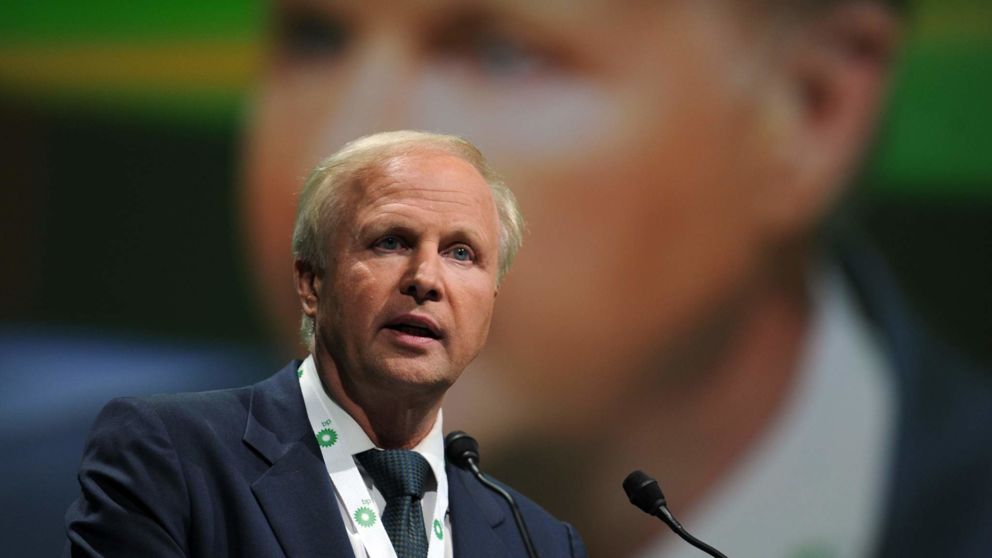BP has agreed to slash millions of pounds from its chief executive’s maximum pay deal for the next three years in a bid to head off the threat of a fresh shareholder revolt.
Sky News has obtained the details of the FTSE-100 oil giant’s future pay policy – which will be disclosed in its annual report later this week amid intense political scrutiny of boardroom pay packages.
Insiders briefed on the terms of the deal that will be awarded to Bob Dudley, BP’s chief executive, said the company had decided to reduce his maximum long-term incentive plan award from seven times his $1.85m (£1.48m) basic salary to five times.
The framework, which will also apply to other top BP directors between this year and 2019, will see his annual bonus remain constant at a maximum of 225% of his salary.
Crucially, though BP has bowed to investors’ demands to toughen the criteria for awarding bonuses to executives.
Under the plans to be published this week, Mr Dudley will receive half his maximum annual bonus entitlement – about £1.66m, or 112.5% of his base salary – if the company achieves on-target levels of performance.
Previously, he could earn 150% of his salary in short-term bonuses just for meeting those targets.
City sources said the company had informed shareholders that it would also scrap the matching element of Mr Dudley’s short-term incentive scheme, which meant that he could previously earn as much as an additional £2.2m annually by deferring the payment of up to two-thirds of the bonus award for three years.
Excluding pension contributions and other payments, Mr Dudley’s maximum annual pay over the next three years will be roughly £12.2m – comprising his salary, an annual bonus of £3.33m and an LTIP award worth up to £7.4m.
That compares to a total package previously valued at up to £17.4m including the matching share awards – meaning that BP has axed more than £5m of potential pay for its chief executive.
In 2015, Mr Dudley was paid $19.6m (£14m at April 2016 exchange rates), thanks partly to a $6.5m increase in the value of his BP pension.
Sources said the concessions being offered by BP would probably be enough to win the support of investors at its AGM in mid-May, following an extensive round of meetings lasting more than six months.
The news of BP’s plans comes as MPs on the Business, Energy and Industrial Strategy Committee prepare to publish on Wednesday a string of recommendations aimed at curtailing a boardroom pay culture that they believe is too complex, unwieldy and prone to rewarding bosses without clear justification.
BP’s annual report will be among the most closely watched of any major company, coming 12 months after an investor rebellion at its AGM paved the way for ministers to curb excessive boardroom remuneration.
Last year’s revolt saw nearly 60% of investors voting against BP’s remuneration report – a stunning result at such a prestigious British company.
On Saturday, the Daily Mail reported that Mr Dudley’s pay package had been reduced to £8.4m in 2016 – a figure on which BP declined to comment.
Earlier this year, Paul Drechsler, the CBI president, told Sky News that the forthcoming pay season would be critical if businesses wanted to avert more intrusive regulation.
Sky News revealed in January that BP had approached shareholders with a plan to cut Mr Dudley’s maximum LTIP award for the next three years from 700% of his base salary to 550%.
Since then, it has gone further, mindful of City hostility to its pay plans following a period in which it cut thousands of jobs and reported its biggest-ever annual loss.
BP has since begun to turn the corner, drawing a line under most of its remaining liabilities from the fatal Gulf of Mexico oil spill in 2010 – an accident which cost the company well over $60bn (£48bn).
It has continued to shed non-core assets, but has also been in acquisition mode, striking deals with Kosmos Energy in west Africa and an Abu Dhabi state oil company.
BP last year ditched its long-standing adviser on executive pay, appointing consultants at Deloitte in his place.
However, the chairman of its remuneration committee, Dame Professor Ann Dowling, has remained in place – and was re-elected with overwhelming support at last year’s annual meeting.
BP declined to comment on Monday.

